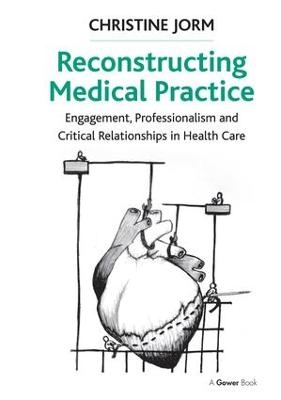
Reconstructing Medical Practice
Routledge (Verlag)
978-1-4094-6766-3 (ISBN)
Reconstructing Medical Practice examines how doctors see health care and their place in it, why they remain in medicine and why they are limited in their ability to lead change in the current system. Doctors are beset by doubts and feel rejected by systems where they should be leaders - some see their role as 'flog[ging] a derelict system to get the last breath of workability out ... for their patients'. Others simply turn away. Rigorous studies carried out at large public teaching hospitals in Australia found that doctors were reluctant to increase safety in the wider health system, despite making every effort for their 'own' patients. Doctors' self-esteem was found to be delicate due to the uncertain nature of their work; colleagues provide the support doctors need to deliver good care. However, these essential relationships and their cherished connections with patients have disadvantages: reducing doctors' ability to admit to error. On top of this, senior doctors predict a future bereft of professional values - one where medicine is 'just a job'. While the loss of professional identity introduces new risks for patients and doctors, the repercussions of the more self-serving attitudes of younger doctors are unknown. Reconstructing Medical Practice concludes that regulation, despite its recent proliferation, is a clumsy and limited approach to ensuring good care. It presents original and much-needed ideas for ways to rebuild the critical relationship between doctors and the system. By better valuing communicative interactions and workplace relationships, safe and satisfying medical practice can be reconstructed.
Christine Jorm, MBBS (Hons), MD, PhD, FANZCA is Associate Professor at Sydney University in Australia, and currently coordinates the professionalism theme of the Sydney Medical Programme. She has doctorates in neuropharmacology and sociology, and is a Fellow of the Australian and New Zealand College of Anaesthetists, practising as an anaesthetist for more than 15 years before her interest in quality assurance in anaesthesia led to full-time cross-disciplinary work in patient safety and quality. She was then recruited as a foundation staff member for the Australian Commission on Safety and Quality in Health Care in 2006. She provided specialist safety and quality advice and developed policy and strategy for the Commission until moving to Sydney University in 2010. She has published on a broad range of safety and quality topics, health policy and medical culture and is passionate about finding ways to enable the doctors of the future to better engage with and influence the healthcare system.
Chapter 1 Setting the Scene; Chapter 2 The Safety and Quality Movement; Chapter 3 Motivations for Studying Medicine; Chapter 4 Professionalism – Being a Good Doctor; Chapter 5 Colleagues or Conspirators? – Doctors Do Not Act; Chapter 6 Working with Uncertainty; Chapter 7 Why Doctors Need their Colleagues; Chapter 8 The Doctor–Patient Relationship; Chapter 9 Doctors’ Alienation from the Healthcare System; Chapter 10 Reconstructing Medical Practice;
| Erscheint lt. Verlag | 18.2.2013 |
|---|---|
| Verlagsort | London |
| Sprache | englisch |
| Maße | 174 x 246 mm |
| Gewicht | 453 g |
| Themenwelt | Medizin / Pharmazie ► Medizinische Fachgebiete ► Medizinethik |
| Medizin / Pharmazie ► Pflege ► Ausbildung / Prüfung | |
| Studium ► Querschnittsbereiche ► Geschichte / Ethik der Medizin | |
| Sozialwissenschaften ► Kommunikation / Medien ► Buchhandel / Bibliothekswesen | |
| Sozialwissenschaften ► Soziologie | |
| Technik ► Umwelttechnik / Biotechnologie | |
| Wirtschaft ► Betriebswirtschaft / Management ► Personalwesen | |
| Wirtschaft ► Betriebswirtschaft / Management ► Planung / Organisation | |
| Wirtschaft ► Betriebswirtschaft / Management ► Unternehmensführung / Management | |
| Wirtschaft ► Volkswirtschaftslehre | |
| ISBN-10 | 1-4094-6766-X / 140946766X |
| ISBN-13 | 978-1-4094-6766-3 / 9781409467663 |
| Zustand | Neuware |
| Haben Sie eine Frage zum Produkt? |
aus dem Bereich


